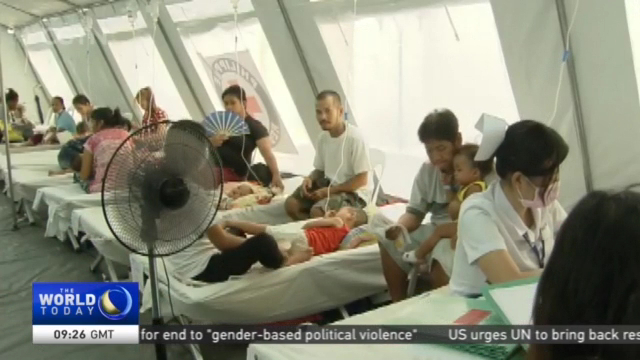
19:07, 09-Mar-2019
Measles Outbreak: Over 16,000 cases reported in the Philippines, 261 dead
Updated
19:00, 12-Mar-2019
02:39

It has been a little over a month since the Philippines declared a measles outbreak. But it appears the end is nowhere in sight, as the numbers continue to rise. As of March 2nd, the country's health department had recorded more than sixteen-thousand cases. The Philippines is among several countries suffering from what UNICEF describes as an alarming global surge of measles cases. CGTN's Barnaby Lo has this report.
Three-year old Cedric Mustrado has been in the hospital for weeks. He had barely survived after getting diagnosed with measles in February. Now, his mother, Cindy says, he's fighting complications.
CINDY MUSTRADO MEASLES PATIENT'S MOTHER "Even if I want to show that I'm being strong for him, it's hard. I don't want him to see me crying, but I can't help it. I wish I could switch places with him."
It's a sentiment common among parents of measles patients, mostly young children, whose numbers are overwhelming even here, in one of the biggest government-run hospitals in the Philippines. In early February, the country's health department declared a measles outbreak.
BARNABY LO MANILA "Despite mass immunization efforts by the health department, the number of measles cases in the Philippines continue to go up, as well as the number of those who've died from the disease. But there is a silver lining – the immunization rate is also starting to inch up.
These health workers had planned to go house to house to convince parents to get their children vaccinated against measles."
JENNIFER HERRERA HEALTH WORKER "Parents became wary of vaccines because of the controversy over the dengue vaccine Dengvaxia."
But there was no need to engage parents this time. In fact, the health workers set themselves up at a daycare center and never left. Parents took their children to them instead. A positive sign, but UNICEF, the United Nations' child rights agency, warns against complacency.
JULIA REES DEPUTY REPRESENTATIVE OF UNICEF PHILIPPINES "Many of the healthcare gains are directly as a result of the fact that we invested in immunization for many years, and we continue to do some, and we can't drop the ball and assume that kind of these diseases will go away."
And even without the Dengvaxia scare, immunization rates have been steadily dropping over the last few years in the Philippines, according to UNICEF. Worse, it is a global phenomenon. Health experts and advocates agree – the only solution is vaccination. Barnaby Lo, CGTN, Manila.

SITEMAP
Copyright © 2018 CGTN. Beijing ICP prepared NO.16065310-3
Copyright © 2018 CGTN. Beijing ICP prepared NO.16065310-3